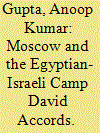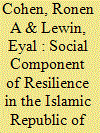| Srl | Item |
| 1 |
ID:
177054


|
|
|
|
|
| Summary/Abstract |
What can the poetry chosen for epitaphs on graves tell us about the political and cultural development of post-revolutionary Iran and the politics of death and dying under the Islamic Republic? This article explores contemporary Persian epitaph poetry as a valuable medium for understanding the socio-political dynamics of Iranian society. By analyzing the epitaphs of the Iran–Iraq war martyrs, who are buried in Zahra’s Paradise public cemetery in Tehran (Behesht-e Zahra), a new nomenclature can be established for the religious, political and socio-cultural ideas underpinning death and the afterlife.
|
|
|
|
|
|
|
|
|
|
|
|
|
|
|
|
| 2 |
ID:
164295


|
|
|
|
|
| Summary/Abstract |
This article examines the domestic causes of the Iran–Iraq War. It delves into secret discussions among Iranian political and military elites during the conflict, their analyses of their own performance on the battlefield, and their revealing public disputes and blame game decades later. It contends that an underexplored and yet critical driving force behind Iran’s prosecution of the war was factional politics. Along with state-level geo-strategic, regime-level security and individual-level ideological concerns, factional factors must also be examined to understand Tehran's war-time decisions. Iran’s factional rivalries began between the Islamists and the nationalists; and between the Islamic Revolutionary Guard Corps (IRGC) and the army at war’s outbreak, and eventually penetrated into the heart of the Islamist camp between the militant clerics and the IRGC.
|
|
|
|
|
|
|
|
|
|
|
|
|
|
|
|
| 3 |
ID:
168628


|
|
|
|
|
| Summary/Abstract |
As Iraqi forces invaded the Iranian border shortly after the Islamic Revolution, the Islamic Revolutionary Guard Corps (IRGC) participated in the battle along with the debilitated Iranian Army. The IRGC was a young religious-revolutionary institution that lacked the resources that revolutionary armies and militias conventionally rely on. Nevertheless, it survived the battle pressure and even achieved relative military successes in the second year of the war. By examining personal narratives written by Iranian veterans, this article argues that in the void of conventional resources in the first year of the war, the Guards retrieved elements of their Shia background to recognize a religiously inspired charisma in every combatant who would devotedly step up for martyrdom. This shared understanding of the omnipotent charisma was then acknowledged in action—by commanders’ deployment of it to impose order and through frequently held Shia rituals on the battlefield. It thereby created an alternative source of cohesion and motivation that led to the IRGC’s survival and prepared them for further successful steps by the end of the war’s first year.
|
|
|
|
|
|
|
|
|
|
|
|
|
|
|
|
| 4 |
ID:
189417


|
|
|
|
|
| Summary/Abstract |
In the wake of the October 1973 war, Moscow sought superpower collaboration that would ensure its participation in the nascent Arab-Israel peace process, but the direct Israeli-Egyptian negotiations that culminated in the September 1978 Camp David Accords foiled this plan. As a result, the Soviets launched a diplomatic offensive against the deal and tried to forge an Arab front to isolate Egypt, only to see Cairo and Jerusalem signing a fully fledged peace treaty in March 1979. Then came the Iran–Iraq war (1980–88) and further shattered Moscow’s Middle Eastern stance as fears of Tehran’s hegemonic designs led to Egypt’s reincorporation into the Arab fold.
|
|
|
|
|
|
|
|
|
|
|
|
|
|
|
|
| 5 |
ID:
174832


|
|
|
|
|
| Summary/Abstract |
This article examines the social components of national resilience as the source of the Islamic Republic of Iran’s ability to cope with possibly lethal blows and economic setbacks through four stages: (I) an account of the 1980–1988 Iran–Iraq War and the surprising outcome that left Iran undefeated, (II) a review of several theories that can aid us to analyze Iran’s national resilience ability, (III) an analysis of Iran’s wartime survival using the abovementioned theoretical infrastructure, (IV) a concise review of current issues in Iranian society which concludes with an evaluation of the state of Iran’s resilience regarding attacks on their nuclear program and its ramifications.
|
|
|
|
|
|
|
|
|
|
|
|
|
|
|
|